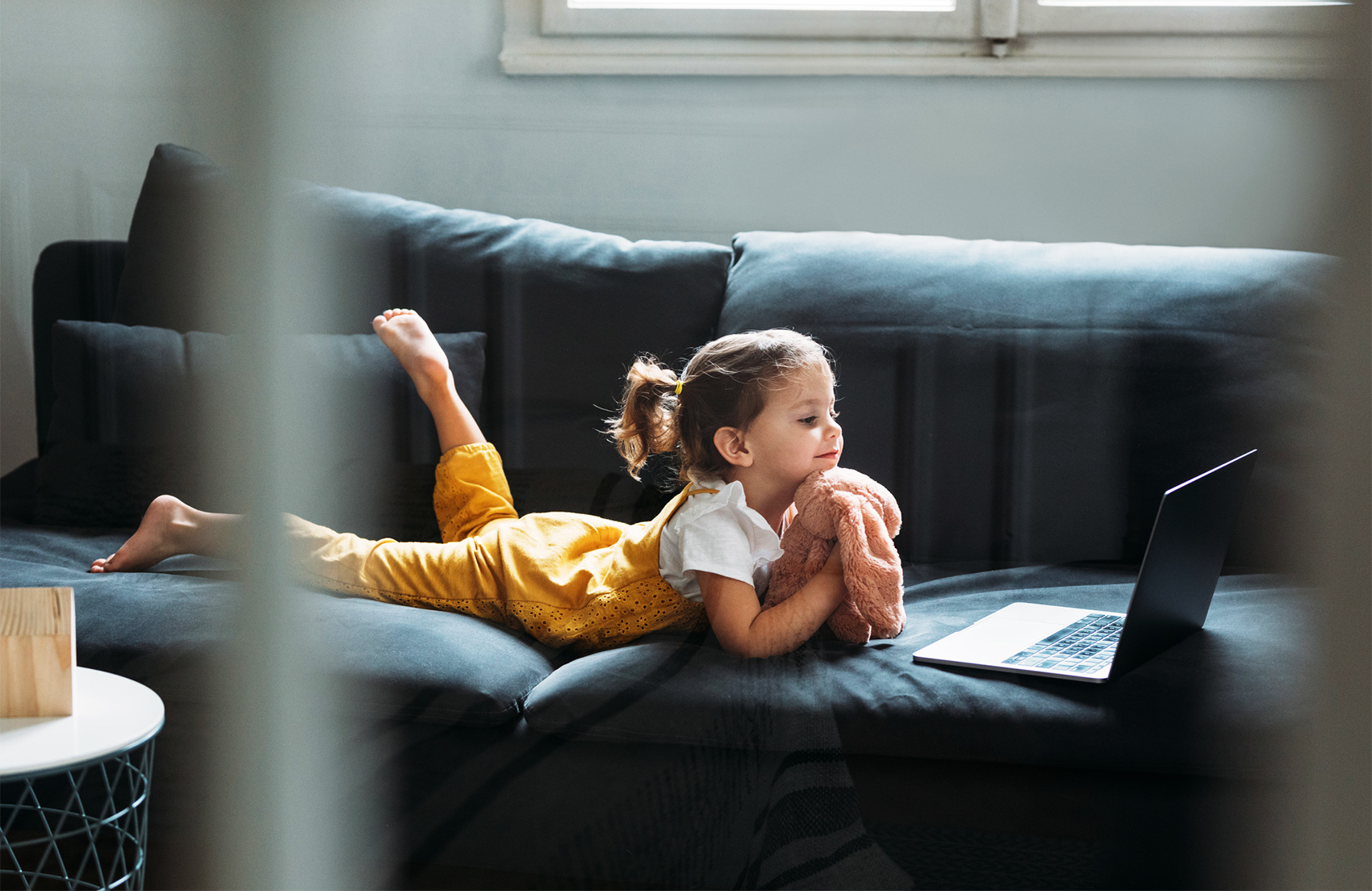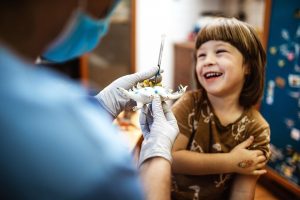
Czas spędzany przez dziecko przed ekranem – jak go ograniczyć?
Spis treści:
Czas spędzany przez dzieci przed ekranem – rekomendacje
Raport z Ogólnopolskiego Badania Higieny Cyfrowej 2022 (przeprowadzonego na dorosłych użytkownikach internetu) pokazuje, że z telefonu komórkowego korzysta przez różny czas 96,9 proc. internautów w dni robocze i 97,8 proc. internautów w dni wolne. Młodsi wcale im nie ustępują. Jak wynika z Badania Założycielskiego Krajowego Instytutu Mediów, ze smartfonów korzysta 42,7 proc. dzieci w wieku cztery-dziewięć lat, a w grupie pomiędzy 10. a 15. rokiem życia to już 91,5 proc.
Czas spędzany przez dzieci przed ekranem to temat, który powinien zainteresować dorosłych – zarówno jeśli chodzi o bezpieczeństwo w sieci i towarzyszenie młodym ludziom w odkrywaniu cyfrowego świata, jak i w kontekście równowagi aktywności podejmowanych offline i online.
Jak zainteresować dziecko aktywnościami poza ekranem?
Ekran – telewizora, komputera, telefonu komórkowego – przyciąga. To najczęściej po prostu łatwa rozrywka, nie musimy się namęczyć, włączamy i już. Kluczem jest, aby urządzenia elektroniczne ułatwiały nam życie, a nie je dominowały. Aby oderwać dzieci od elektroniki i ograniczyć czas spędzany przed ekranem, warto zaproponować atrakcyjne formy spędzania czasu wolnego, które nie tylko zajmą młodego człowieka, ale i pomogą mu rozwijać umiejętności czy relacje z innymi.
To, które aktywności będą w stanie odciągnąć dziecko od ekranu, zależy od głównego zainteresowanego, m.in. jego potrzeb, ale i temperamentu. Znaczenie ma także to, jak spędza czas przed ekranem – czy to pasywne oglądanie filmików, czy interakcje z innymi (np. podczas grania), czy to głównie komunikacja, a może tworzenie, rozwijanie zainteresowań?
Jednym spodobają się wszystkie działania, w których będą uczestniczyli wspólnie z rodzicami, inni zajmą się czymś, co podoba się kolegom z klasy, jeszcze inni będą chcieli odnaleźć nietypowe hobby. Przede wszystkim powinniśmy pozwolić dziecku na odkrywanie, na próbowanie coraz to nowych aktywności. To nie zawsze wiąże się z dużymi nakładami finansowymi (wydatki zazwyczaj związane są z różnego rodzaju zajęciami dodatkowymi), może chodzić np. o przerabianie ubrań czy o odzyskiwanie przyklejonych do kopert znaczków – coś, co można robić w domu, wykorzystując dostępne rzeczy.
Co jeszcze może zainteresować dziecko? Możesz podpowiedzieć, aby założyło tematyczny klub. Popularne są te czytelnicze, których uczestnicy czytają konkretne książki, a następnie dzielą się wrażeniami (najmłodszym mogą pomóc rodzice lub starsze rodzeństwo), ale można i pobawić się w śledczych, i regularnie omawiać zmiany, które zachodzą w najbliższej okolicy (to nie tylko nowe budowle, ale i cykl życia roślin), organizować plenery malarskie, wspólne robienie bransoletek z gumek czy gadżetów z modeliny. Ważne, aby mieć kontakt z rówieśnikami, dzielić się wiedzą i pomysłami – spędzać razem czas, rozmawiać ze sobą na żywo, bez pośrednictwa komunikatorów. A może rozwiązaniem będzie nagrywanie vlogów “na sucho”, bez włączania kamery? To nie tylko haule zakupowe, to ćwiczenie dykcji, poprawne konstruowanie wypowiedzi. Nie trzeba tego robić w pojedynkę, może to dobry pomysł na odgrywanie scenek z przyjaciółką?
Ograniczenie czasu spędzanego przez dzieci przed ekranem
Zanim zaczniemy wprowadzać ograniczenia w korzystaniu z urządzeń elektronicznych przez dzieci zastanówmy się, jak to wygląda u nas, jaki przykład dajemy. Nie wypadamy wiarygodnie, gdy mówimy o zagrożeniach płynących z ciągłego korzystania z elektroniki, a przedłużeniem naszej ręki jest smartfon. Na nic prośby i groźby związane z ograniczeniem czasu przed ekranem, gdy płynnie wymieniamy ten od komputera, na ten od telewizora. Jak mamy zachęcić dziecko do aktywności fizycznej, do różnych form spędzania wolnego czasu, jeśli widzi nas tylko w towarzystwie urządzeń elektronicznych?
Jak wprowadzić ograniczenia w korzystaniu z urządzeń elektronicznych przez dzieci? Jest kilka możliwości. Możemy np.:
Umówić się na korzystanie z konkretnych sprzętów w konkretnych sytuacjach (np. telefon poza domem służy do utrzymywania kontaktu, w domu aplikacje pod kontrolą rodziców, granie na konsoli tylko podczas odwiedzin znajomych, filmy oglądamy wspólnie).
Ustalić czas, w którym dziecko będzie miało dostęp do elektroniki (np. godzinę dziennie).
Spisać zasady, do których wszyscy będziecie się stosować (np. odkładanie urządzeń na czas posiłków, wyłączenie elektroniki maksymalnie godzinę przed snem).
Nie jest to łatwe, ale dobrze, aby czas spędzony przed ekranem nie był nagrodą lub karą. Warto uczyć dobrych nawyków, a nie jednego dnia coś dawać, drugiego – zabierać.
W monitorowaniu czasu przed ekranem pomogą różnego rodzaju aplikacje – niektóre są dostępne w danym oprogramowaniu, inne musimy pobrać. Dzięki nim nie tylko będziemy wiedzieć, przez jaką część dnia elektronika towarzyszy dziecku, ale i zarządzać czasem spędzonym w konkretnych aplikacjach. Młody człowiek może np. mieć możliwość korzystania z telefonu przez godzinę dziennie, ale nie chcemy, aby spędzał tej godziny w mediach społecznościowych – blokujemy dostęp do konkretnych aplikacji (możemy ustalić, że korzystamy z nich jedynie wspólnie, razem poznając różne funkcje, sprawdzając, co publikują znajomi itp.).
Korzystanie z technologii przez dzieci – kształtujemy zdrowe nawyki
Od technologii nie uciekniemy – i dobrze. To rozwiązania, które ułatwiają codzienne życie, to możliwości, o których poprzednie pokolenia nawet nie marzyły. Plusy z korzystania z technologii przez dzieci to m.in.:
- możliwość komunikacji (także w języku obcym);
- podtrzymywanie relacji (z obecnymi znajomymi, ale i z tymi z przeszłości);
- treści, które rozwijają zainteresowania;
- nauka myślenia strategicznego;
- nauka współpracy, odpuszczania;
- narzędzie dydaktyczne pomocne w nauce.
Całkowite odcięcie od ekranów może być powodem wykluczenia w grupie rówieśniczej, ale i utratą pewnych kompetencji społecznych. Jednak technologia to także wiele zagrożeń. Dlatego ważne jest, aby towarzyszyć dziecku w jej odkrywaniu. To ważne zadanie dla rodziców – jeśli my tego nie zrobimy, wyręczą nas inni, nie zawsze zgodnie z naszymi przekonaniami. Jak kształtować zdrowe nawyki korzystania z technologii przez dzieci? Warto m.in.
Rozmawiać o zagrożeniach i konsekwencjach nadmiernego korzystania z urządzeń.
Tłumaczyć, jak czas spędzony przed ekranem wpływa na nasze zdrowie.
Nie bać się mówić, że czegoś nie wiemy, wspólnie odkrywać nowe programy, aplikacje.
Budować świadomość na temat równowagi pomiędzy życiem online i offline (ustalone limity powinny pozostawiać czas na aktywności poza ekranem).
Co powinnyśmy robić?
Towarzyszyć dziecku (szczególnie temu najmłodszemu), gdy korzysta z elektroniki, sprawdzać gry i aplikacje – nie zawsze wszystko „dla dzieci” naprawdę jest OK dla najmłodszych, odkładać elektronikę, np. podczas posiłków, przed snem, planować czas poza ekranem, zachęcać do aktywności, najważniejsze – dawać dobry przykład.
Konsekwencje nadmiernego korzystania z urządzeń elektronicznych przez dzieci
Wirtualny świat to szereg korzyści, ale i wiele niebezpieczeństw. Dzieci mogą być narażone m.in. na: treści zachęcające do niebezpiecznych zachowań (np. różnego rodzaju challenge), przemoc, zachowania ryzykowne,treści seksualne, nieprawdziwe informacje a nawet cyberprzemoc.
Nadmierne korzystanie z urządzeń elektronicznych przez dzieci może prowadzić m.in. do: problemów ze snem; zaniżoną samooceną; braku aktywności fizycznej, czasu spędzonego na świeżym powietrzu; problemów z wagą; zmian nastroju; problemów z koncentracją; spadku empatii; izolacji społecznej.
Czas spędzany przed ekranem wpływa także na rozwój mózgu, powoduje problemy ze wzrokiem, sprzyja wadom postawy. To zaburzone relacje rodzinne i rówieśnicze, negatywny wpływ na rozwój psychospołeczny, życie w ciągłym napięciu – oczekiwanie na nowy odcinek vloga, na kolejny poziom w grze, na wirtualne nagrody.
Jak sobie radzić z tymi wyzwaniami? Przede wszystkim trzeba być. Musimy towarzyszyć dziecku podczas odkrywania kolejnych urządzeń, tłumaczyć zasady ich działania, wspólnie poznawać nowe opcje. Relacja, którą budujemy od najmłodszych lat, to podstawa. Dzięki niej dziecko będzie nam ufać, zaakceptuje to, co mówimy (o zaletach, ale i o zagrożeniach), nie pójdzie pytać obcych. Kolejny filar to zasady – ustalone wspólnie, do których wszyscy się stosujemy. Musimy w nie wierzyć, być konsekwentni. A jeśli to, co robimy, nie przynosi efektów, nie bójmy się skorzystać z pomocy specjalistów.
Źródła:
- Krajowy Instytut Mediów, Badanie Założycielskie KIM 2022.
- Bigaj M. (red.), Woynarowska M. (red.), Ciesiołkiewicz K., Klimowicz M., Panczyk M. (2023).
- Higiena cyfrowa dorosłych użytkowniczek i użytkowników internetu w Polsce. Warszawa, Instytut Cyfrowego Obywatelstwa, www.cyfroweobywatelstwo.pl [dostęp: 20.09.2023 r.]
- World Health Organization (2019). Guidelines on physical activity, sedentary behaviour and sleep for children under 5 years of age. World Health Organization.











































